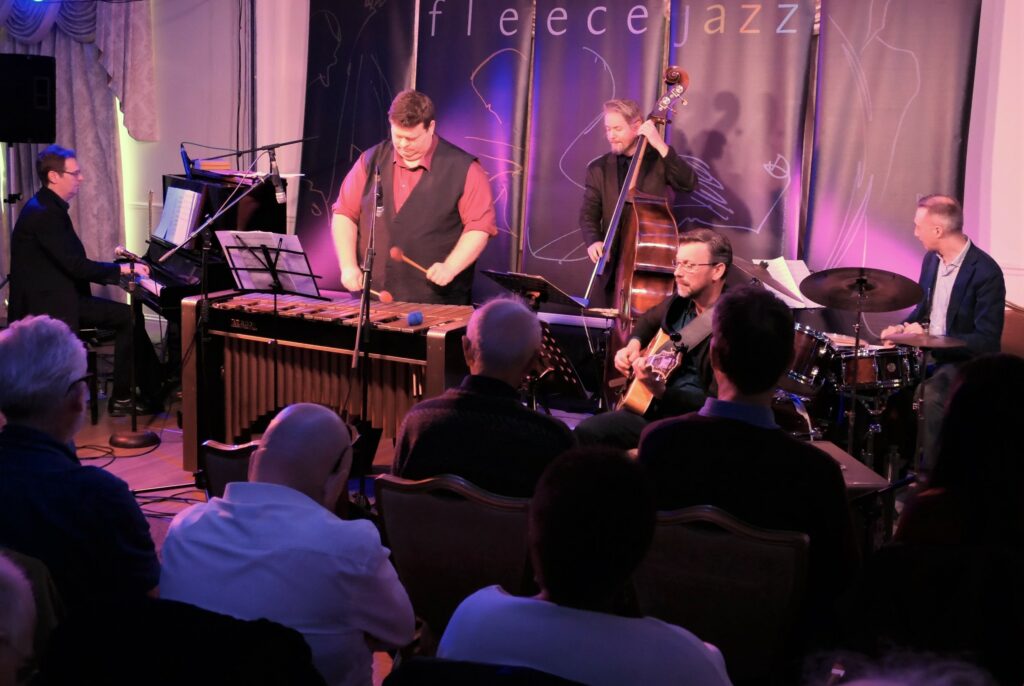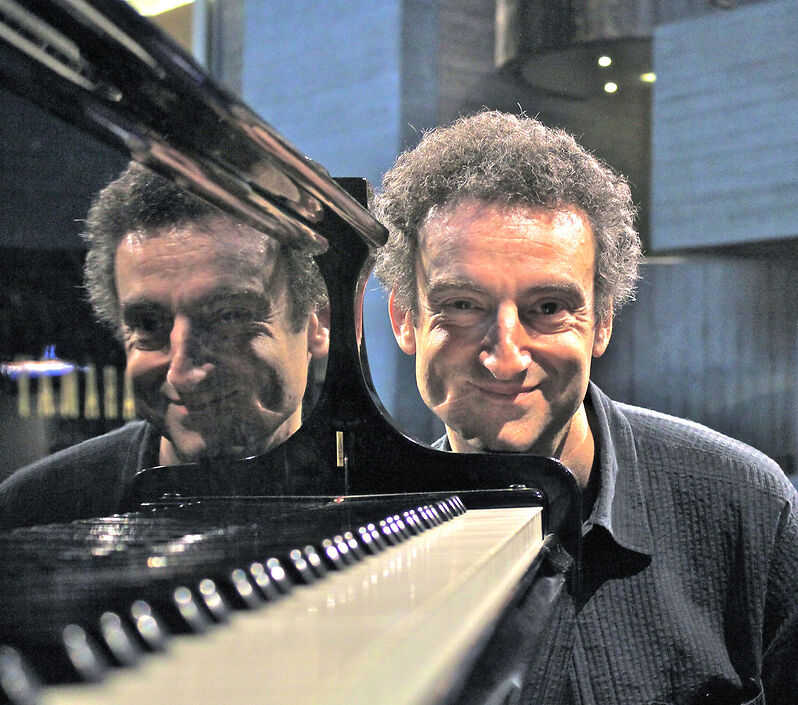
(I normally put together a setlist for each gig that I attend at Fleece Jazz . Dave Lyons is currently on holiday in Canada and so it falls to me to write this week’s review built around the setlist.)
Last night, we had a fine quintet of musicians under the direction of Nick Tomalin, performing and interpreting the music of British pianist, George Shearing. The band features the original instrumentation of the Shearing quintet, including guitar and vibraphone and performs music ranging from Shearing’s best-known tunes like ‘Lullaby of Birdland’ and ‘Conception’ along with less well-known compositions and arrangements.
The “Shades of Shearing” project is very much a labour of love: the respect and admiration for Shearing and his music from all five musicians is palpable throughout the evening’s performance. For this reviewer, it was a revelation having previously felt little connection with Shearing’s music aside from the odd cover such as Ella singing ‘Lullaby of Birdland’. Shades of Shearing led me to re-evaluate this and realise that there was more depth to George’s music as well as a real jazz sensibility.
The opener, ‘September in the Rain’, combining radio-friendly melodicism with full-blooded bebop, was a big hit for George in 1949, selling nearly a million copies. The head is played in the famous ‘Shearing Style’ with Nat Steele on vibes and Dave Warren on guitar playing the melody an octave apart and Nick Tomalin playing block chords behind them. During the second chorus Tomalin demonstrates the ‘locked hands’ style of George Shearing and plays some technically demanding double-time passages.
Throughout the gig, Nick explains the background to each song in the context of Shearing’s life and work. After the first number, he tells us about the challenging circumstances in young George’s life: the youngest of nine children; blind from birth; his father delivering coal and his mother cleaning trains for a living. George was something of a musical prodigy as he was offered various scholarships to continue his musical education. In true jazz style though, young George instead got a job playing piano for “25 bob a week” (25 shillings or £1.25 in today’s money) at the local pub. He first visited America in 1946 and moved there permanently the following year, arriving at the height of the bebop boom.
There is plenty of opportunity for each musician in the “Shades of Shearing” quintet to demonstrate his chops and that is exploited to the full in the next number, ‘Consternation’. Nat Steele is a vigorous, resourceful performer who demonstrated his enormous prowess on vibes throughout the evening – all eyes were on his speed and dexterity as he fronted the band. Dave Warren’s guitar work echoed this with a distinct bebop style which reminded me of Grant Green’s lithe, loose, slightly bluesy playing. Once again, we had the pleasure of hearing Luke Fowler on double bass, who impressed us with his nimble finger-work as he took the lead or soloed on many numbers over the course of the gig. Luke was ‘depping’ and this was his first performance with the quintet. An amazing talent! After two numbers where brushes were employed effectively by Matt Fishwick to set up a shuffling rhythm on the drums, he excels on the latin-tinged ‘Mamboing’ where he knocks out an urgent and vigorous rhythm to drive the pace forward. Nick explained how mambo became popular in the mid-1950s in New York, triggering a big dance craze. George then began incorporating Cuban music into his repertoire and was at the forefront of blending the new Mambo style with jazz – continuing on from Dizzy Gillespie’s experiments with Afro-Cuban music in the late 1940s.
No tribute to George Shearing would be complete without ‘Lullaby of Birdland’, George’s best-known tune which was written for Morris Levy, the owner of Birdland, as the theme music for a radio show broadcast from the club. Here it was taken at a brisk pace with piano, vibes and guitar delivering the head in unison before Nick takes a beautiful melodic solo, again switching to block chords in the bridge.
‘September Samba’ – a bossa nova in the style of George Shearing for a guitar-vibes-piano quintet – was an original composition by Nick Tomalin; an uptempo, vivacious tune with a warm feel that complemented the Shearing numbers admirably.
‘Love Is Just Around The Corner’ completed the first set, after Nick related how George and the quintet enjoyed indulging in wordplay, by replacing the word ‘love’ with ‘lunch’ in song titles. Try it for yourselves …. It was good to hear the band stretch out, with everyone contributing inspired extended solos. Nick’s backing riffs behind the solos and choruses build the excitement.
The second set opened with ‘Oh look at me now’, from the 1961 album, ‘The Swingin’s Mutual!’ where the George Shearing quintet was accompanied by the vocalist Nancy Wilson. The song is best known from its interpretation by Frank Sinatra.
The more demanding composition ‘Conception’, a 1950 jazz standard written by Shearing is widely regarded as one of the best original bebop tunes ever written. As Nick explained, it is one of the most challenging tunes to improvise on, both because of the speed of the harmonic rhythm and the tricky modulations but the band appeared to breeze through it, negotiating the corners with ease. There is a suggestion that ‘Conception’ was written by Bud Powell, but no-one really takes this seriously. Interestingly, the original score was adapted by Miles Davis in 1950, who created an arrangement that kept Shearing’s chord changes and main theme. He also rewrote it in 1950 to create an entirely new main theme for his Birth of the Cool project, giving the composition the title ‘Deception’. Oh, what a tangled web . . . deception indeed.
A mambo-ised version of George Gershwin’s ‘Let’s Call The Whole Thing Off’ was an interesting adaptation and despite Nick’s self-deprecating comments, the original was easily recognisable and their interpretation was quite charming. Equally welcome was the second Tomalin original of the evening, ‘Blues for George’. We were the first ever audience to hear this and it would be very nice to hear it again on a future recording.
As a prelude to the next number, Nick explained how he had met George Shearing in 1993 as a student at the Guildhall School of Music as part of a South Bank Show special about George’s life and work. Nick took part in a masterclass with George teaching some of the piano students. The students, including Nick, were asked to perform a piece in front of George and receive constructive feedback. Nick performed the ballad ‘I’ll Never Smile Again’ after which George told him that it was fine but too loud! No such concerns from the rendition that we got to hear.
We conclude (almost) with Charlie Shavers’ ‘Undecided’ as arranged by Shearing and originally featuring Toots Thielemans, the harmonica player, on guitar. But of course, this being Fleece Jazz we couldn’t go home without an encore and the band duly obliged with a George Shearing composition that he never recorded: ‘She’. Not to be confused with the Charles Aznavour ballad, this was Nick Tomalin’s imagined version of Shearing playing his own tune. Bud Powell recorded it and I would recommend that you give that a listen, if you can. Much of what we heard during last night’s gig combined a light, mellifluous melodicism with the harmonic complexity of Bud Powell and was a commendable tribute to George Shearing and his legacy.
We have a three-week break before our next gig on Wednesday 14th June, when we are excited to have the Etheridge–Travis Quartet, a veritable jazz super-group featuring electric guitar, saxophones, flute, organ and drums. John Etheridge and Theo Travis have been the frontline of the legendary band Soft Machine and are joined by a topflight rhythm section comprising one of the most go-to keyboard players in the British jazz and blues scene, Pete Whittaker and drummer Nic France.
Take care,
Steve Jordan
